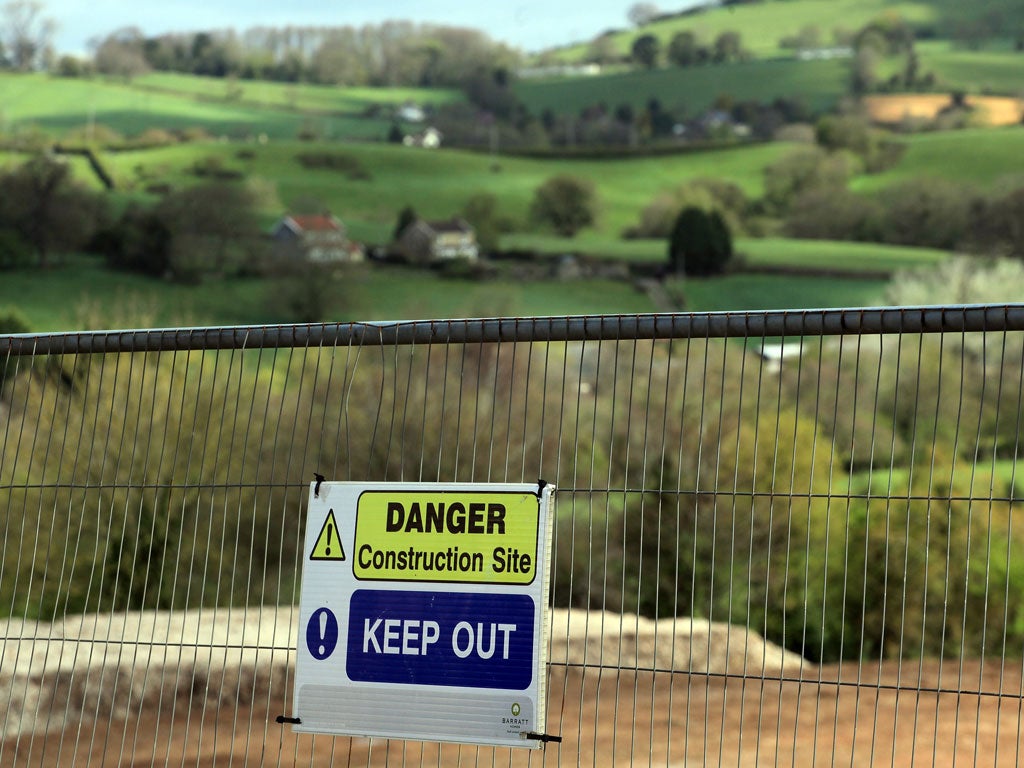Ministers get ready to go for green-belt grab
Conservationists urge the Treasury to rethink, as villages will suffer for no economic benefit

Your support helps us to tell the story
From reproductive rights to climate change to Big Tech, The Independent is on the ground when the story is developing. Whether it's investigating the financials of Elon Musk's pro-Trump PAC or producing our latest documentary, 'The A Word', which shines a light on the American women fighting for reproductive rights, we know how important it is to parse out the facts from the messaging.
At such a critical moment in US history, we need reporters on the ground. Your donation allows us to keep sending journalists to speak to both sides of the story.
The Independent is trusted by Americans across the entire political spectrum. And unlike many other quality news outlets, we choose not to lock Americans out of our reporting and analysis with paywalls. We believe quality journalism should be available to everyone, paid for by those who can afford it.
Your support makes all the difference.Building on green belt land around towns and cities will "irreversibly damage the countryside" yet fail to deliver the Government's hoped-for economic growth, the former poet laureate Sir Andrew Motion warns today, as ministers face charges that they are ignoring the needs of Britain's rural communities.
So desperate is the Treasury in its search for growth that George Osborne is said to want to redesignate protected land to kickstart large-scale housing schemes. Developers wanting to build on protected sites would have to provide new "green belt" elsewhere.
But the row puts the Tory's claim to be the party of the countryside under serious threat, with MPs increasingly worried about the apparent indifference with which the leadership appears to view our green and pleasant land.
Sir Andrew, the president of the Campaign to Protect Rural England, told The Independent on Sunday: "It is unfortunate if some within the Government feel that undermining the green belt will help deliver economic growth. There is little evidence to support this, but plenty that it will irreversibly damage the countryside."
The green belt was created to "prevent towns and cities sprawling into our beautiful countryside" and has been "hugely popular". "Now is the time for all those who care for our green belt, and indeed for the countryside as a whole, to stand up for it – including the many MPs who have assured their electorates that the green belt is safe in their hands."
The Government's attitude towards rural areas is now the subject of a parliamentary inquiry, after the Government's first "rural statement" was repeatedly delayed. Behind-the-scenes negotiations between the Department for Environment, Food and Rural Affairs (Defra) and the Treasury remain fraught. It is understood that the Department for Communities and Local Government is also resisting the attempt to alter green belt rules. A Treasury spokesperson said: "The Government constantly considers a wide range of measures that can contribute to its key priority of delivering sustainable and balanced growth to understand their impact, and will announce initiatives when decisions have been taken."
However, opponents believe the latest assault on the countryside is not unexpected. Mary Creagh, the Labour environment spokesperson, said: "It's clear that the Tories are increasingly out of touch with anyone who cares about the countryside. I have been clear that there are no no-go areas for us and we are committed to creating a rural economy that works for working people."
Stuart Burgess, the chairman of the Commission for Rural Communities, said the chocolate-box perception of village life disguises real problems and hardship. "You can drive through many villages where the rural idyll seems to still be there superficially. But if you dig deeper, there are enormous difficulties."
This year, large urban councils get £454 per person, a 7.5 per cent reduction, while their rural equivalents receive £302, down 8 per cent.
Graham Biggs, the chief executive of the Rural Services Network, said: "Rural residents pay more in council tax, receive less in government grant funding, get fewer services and have to pay a lot more to access those services.
"The cuts get down to the bone and marrow in rural areas, whereas they are breaking the skin and drawing blood in the urban areas."
Join our commenting forum
Join thought-provoking conversations, follow other Independent readers and see their replies
Comments